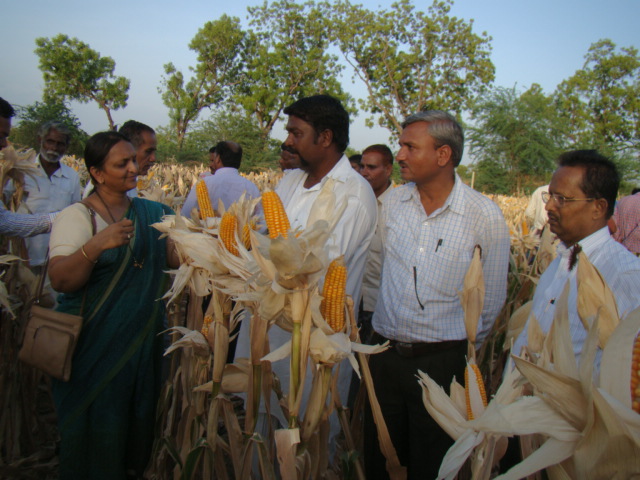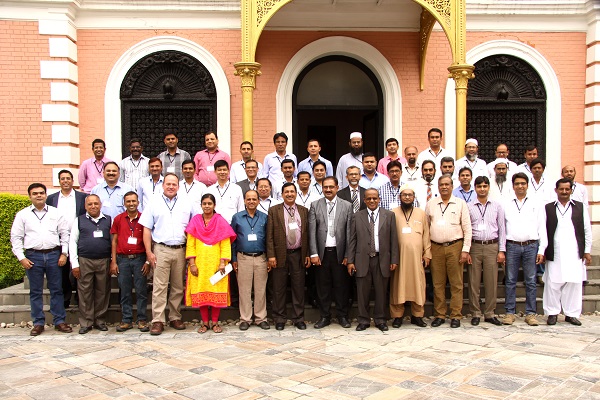
KATHMANDU, Nepal (CIMMYT) — Launched by CIMMYT in January 2013 in collaboration of five public sector institutions and three seed companies from four South Asian countries (Bangladesh, India, Nepal and Pakistan), the Heat Tolerant Maize for Asia (HTMA) project is a public-private partnership that targets resource-poor maize farmers in South Asia who face weather extremes and climate change effects.
Funded by the United States Agency for International Development (USAID) under the Feed the Future (FTF) initiative, HTMA receives significant contributions from various partner institutions and companies. As a result of meticulously planned research on fast-track development and deployment of heat tolerant maize hybrids in South Asia, within three years the first 18 heat resilient hybrids were licensed to HTMA partners for deployment and scale-out. The project’s outputs attracted the attention of other players in the region, especially private seed companies, who expressed their interest in becoming a part of HTMA. A total of 12 new partners (five seed companies each from Bangladesh and Pakistan and two from Nepal) formally joined the project. They participated for the first time in the project’s annual review and planning meeting jointly organized by the Nepal Agricultural Research Program (NARC) and CIMMYT in Kathmandu, Nepal, on 25-26 July 2016.
Executive Director Yamraj Pandey, NARC, Nepal, chaired the inaugural session of the fourth annual review and planning meeting. In his opening remarks, Pandey emphasized the importance of stress resilient maize hybrids for coping with climate change effects and highlighted the remarkable progress HTMA has made in such a short period, giving farmers in stress-prone maize growing Asian environments much-needed heat tolerant hybrids. B.M. Prasanna, Director of CIMMYT’s Global Maize Program and of CRP-MAIZE, gave an overview of the new CGIAR research program on Maize Agri-food Systems, its focus and priorities, and highlighted the importance of stress-resilient maize for improving food security and livelihoods, especially in regions vulnerable to climate change, such as the Asian tropics.
Hailu Tefera, Agricultural Resource Specialist, Bureau for Food Security, USAID, gave an update on the FTF initiative and highlighted its priorities, which include reducing poverty and malnutrition in children in target countries through accelerated inclusive agricultural growth and a high-quality diet. He also informed meeting participants that on 7 July 2016, the US Congress passed the Global Food Security Act (GFSA), which will make FTF into law. Senior CIMMYT maize physiologist and HTMA project leader P.H. Zaidi shared the latest progress made under HTMA including the identification of genomic regions for key heat tolerant traits, development of improved heat tolerant populations using genomic selection, testing of new hybrid combinations, identification of promising hybrids, and the latest capacity development efforts.
At a series of technical sessions, project objective leaders, including Mitch Tuinstra, Purdue University professor, Sudha Nair, CIMMYT molecular maize breeder, and M.T. Vinayan, CIMMYT maize stress specialist for South Asia, presented the latest research results in each objective. HTMA leaders from public and private sector partners presented results of HTMA trials conducted at their locations/countries, and shared a list of top-ranking, best-bet heat-tolerant maize hybrids that will be subjected to large-scale testing and then deployed. They also described efforts aimed at disseminating HTMA hybrids through on-farm demonstrations and farmer-participatory selection of final products.. Most impressive was that each partner has identified a second batch of promising hybrids suitable for their target markets/agro-ecologies.

The project started a unique initiative aimed at developing hybrids using elite maize lines from Pioneer and HTMA. Kamal Pandey from Pioneer highlighted the performance of CIMMYT x Pioneer hybrids, which revealed the significant heterosis between CIMMYT and Pioneer maize germplasm, and should help identify promising joint hybrids suitable for stress-prone ecologies of South Asia. Zaidi and Tuinstra jointly presented HTMA’s progress on capacity development and provided updates on student research projects, including nine Ph.D. and six M.Sc. students, plus a total of 10 workshops/training courses organized so far on subjects such as precision phenotyping, molecular breeding, data management and seed systems. A total 303 participants have been trained, including researchers from public sector institutions and seed companies in Bangladesh, India, Nepal and Pakistan.
The meeting was attended by over 50 program leaders, scientists and representatives from collaborating institutions in South Asia, including BARI (Bangladesh), Nepal’s National Maize Research Program (NMRP), Pakistan’s Maize and Millet Research Institute, Bhutan’s national maize program, and two of India’s state agricultural universities. Also in attendance were partner seed companies in the region, including Pioneer Hi-Bred, Kaveri Seeds and Ajeet Seeds (India), and new seed company partners including Sean Seeds and Hariyali Community Seeds (Nepal); Jullundhar Pvt. Ltd., Kanzo Quality Seeds, CKD Seeds & Fertilizers, Hisell Seeds, and Zamindara Seeds (Pakistan); and Lalteer Seeds, Krishibid, BRAC, ACI Ltd., and Supreme Seeds (Bangladesh). International institutions such as Purdue University, USAID and CIMMYT also participated in the event.
The project’s progress and updates were critically reviewed by the project steering committee (PSC) headed by Prasanna, who expressed great satisfaction with its overall progress and achievements. Speaking for USAID, Hailu Tefera said they are highly impressed with HTMA’s progress and consider it a model public-private partnership. Other PSC members also expressed their satisfaction and agreed that the HTMA team deserves special appreciation for the remarkable progress they have achieved within just four years.

 Climate adaptation and mitigation
Climate adaptation and mitigation